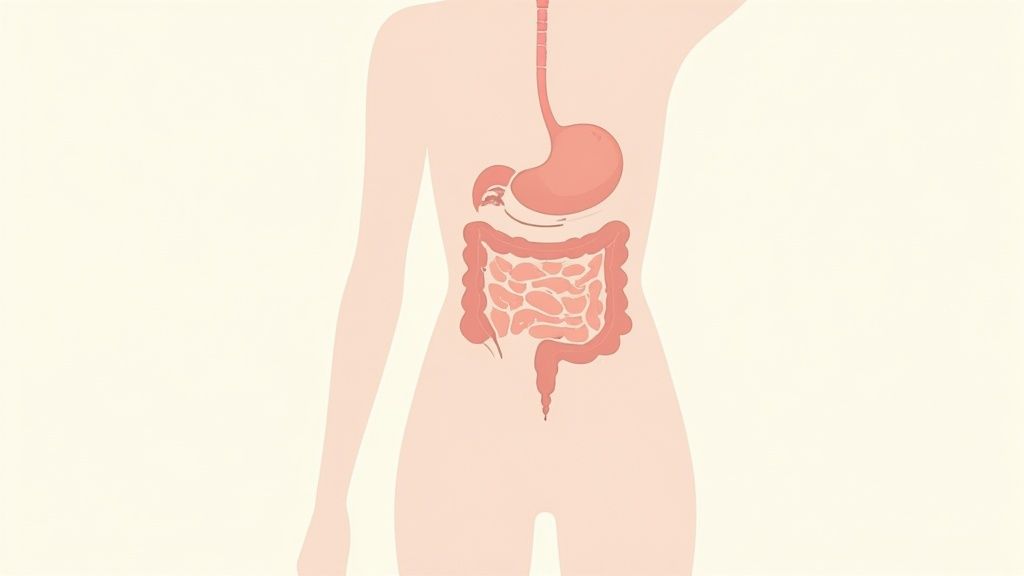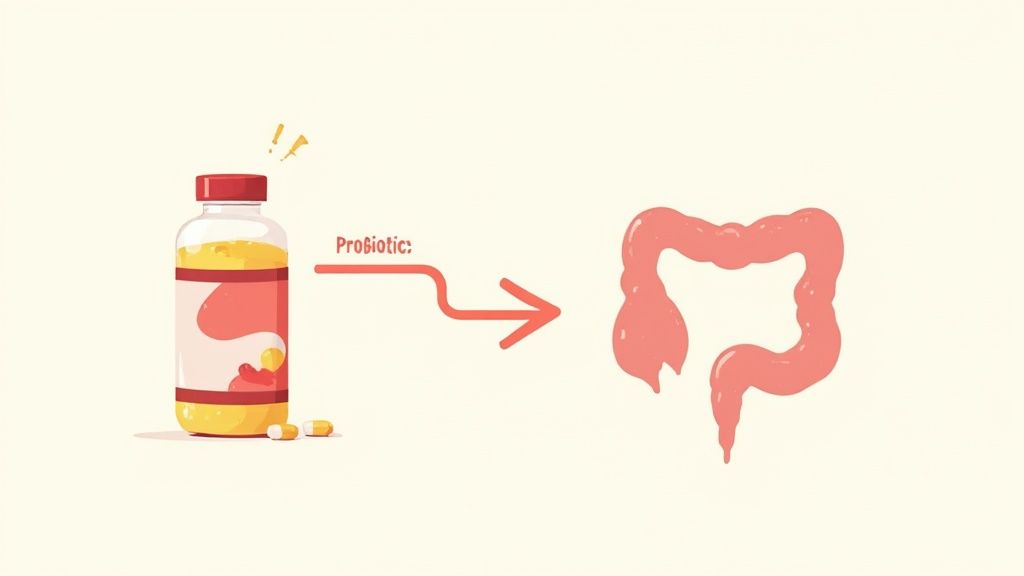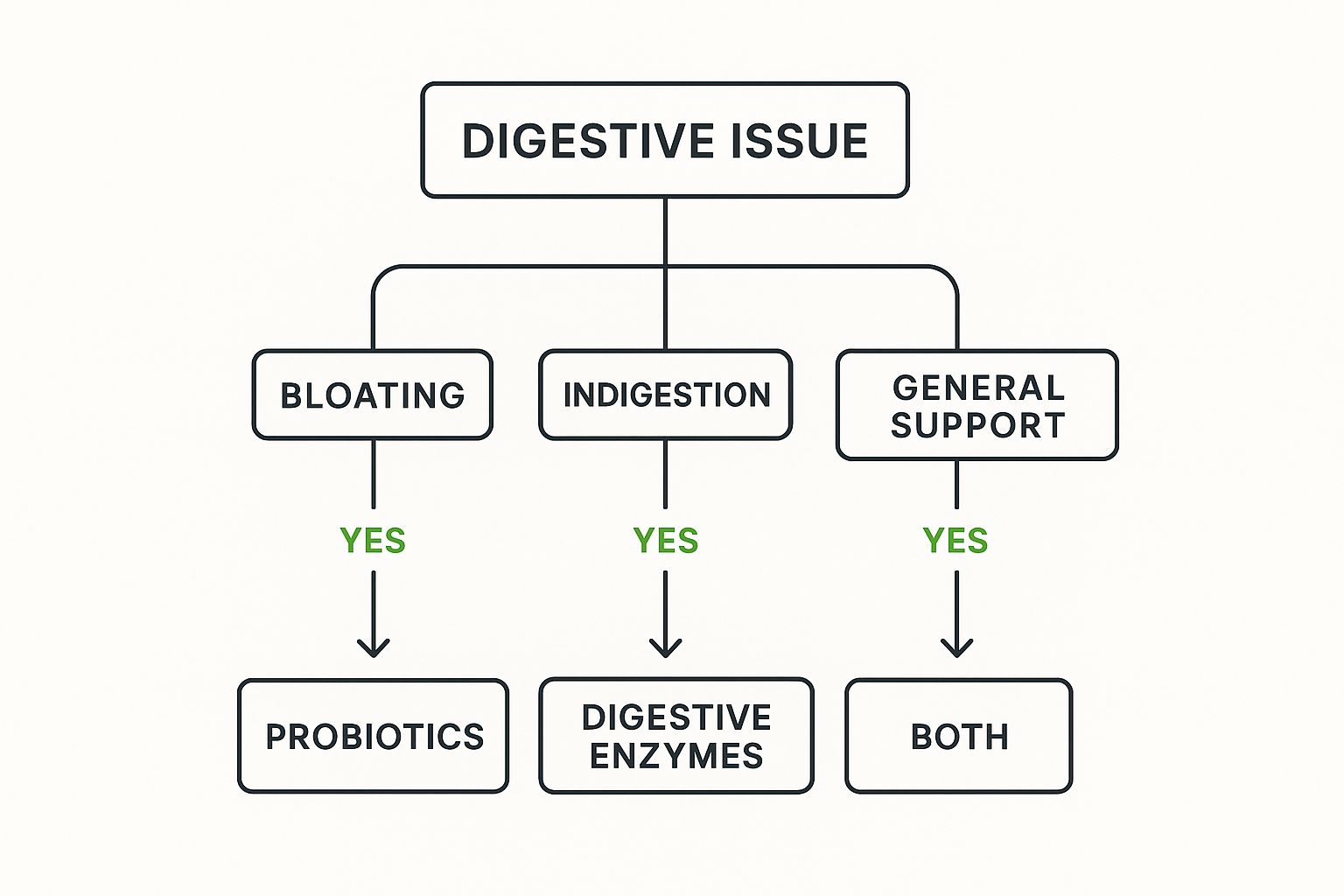Digestive Enzymes vs Probiotics: Which Is Best for Your Gut?
Struggling to figure out where to start in the digestive enzymes vs. probiotics debate? It can feel a bit confusing, but the difference is actually quite straightforward.
Think of it this way: digestive enzymes are the ‘demolition crew’ for your food. They arrive on the scene to immediately break down the fats, proteins, and carbohydrates from the meal you just ate. On the other hand, probiotics are the ‘gardeners’ of your gut, working diligently to cultivate a healthy, balanced internal ecosystem for the long haul.
Your Quick Guide to Digestive Enzymes and Probiotics

Grasping the unique roles these two gut health allies play is the key to choosing the right one for your body. The demolition crew analogy holds up well here. Enzymes are the tools you bring in to tackle the big stuff right away, making food particles small enough for your body to absorb. Probiotics are more like the groundskeepers, ensuring the entire system—your gut microbiome—is thriving day in and day out.
While both are fantastic for digestion, they operate in completely different ways. Enzymes are non-living proteins that act directly on food. Probiotics are living, beneficial microorganisms that become part of your gut's resident microbial community. Here in New Zealand, many people find that a targeted approach works best, using one or the other—and sometimes both—to get the specific results they’re after.
Digestive Enzymes vs Probiotics At a Glance
For a bird's-eye view, this table lays out the fundamental differences between digestive enzymes and probiotics, helping you see where each one shines.
| Attribute | Digestive Enzymes | Probiotics |
|---|---|---|
| Main Job | Break down food (carbs, fats, proteins). | Balance gut bacteria and support the microbiome. |
| Type | Non-living proteins. | Live beneficial microorganisms. |
| Best For | Immediate relief from meal-related bloating and indigestion. | Long-term gut health, regularity, and immune support. |
| How They Work | Act directly on food to aid digestion. | Colonise the gut to improve its overall environment. |
As you can see, their functions are distinct but wonderfully complementary. Digestive enzymes get to work in the upper part of your gastrointestinal tract, breaking food down into nutrients your body can actually use. Meanwhile, probiotics take up residence further down in the lower gut, where they help maintain microbial balance and support healthy fermentation.
Many wellness experts find that combining them can create a powerful synergy for gut health. If you're curious about how to nurture your internal ecosystem, you can learn more about natural probiotics in our detailed guide.
How Digestive Enzymes Target Specific Food Issues

Where probiotics are all about cultivating a healthy gut environment over time, digestive enzymes are the on-the-spot specialists. They get to work directly on the food you’ve just eaten. I like to think of them as tiny biological scissors, each one perfectly shaped to snip a specific food molecule into pieces your body can actually absorb. Without them, even the most nutritious meal would pass through you without delivering much benefit.
Your body is meant to produce these enzymes naturally in your mouth, stomach, and pancreas. But life happens. Things like age, persistent stress, or certain health issues can mean your body isn't producing enough, leading to digestive trouble after meals. This is exactly where a good enzyme supplement can step in, offering immediate support to top up your natural supply.
The Key Players in Digestion
Digestive enzymes aren't a one-size-fits-all remedy; each one has a very specific job. Once you know who does what, it becomes much clearer how they can help with particular food-related issues.
- Amylase: This is your carbohydrate expert. It starts its work in your saliva and continues in the small intestine, breaking down complex starches and sugars from foods like bread, pasta, and potatoes.
- Protease: Made in the stomach and pancreas, this powerful enzyme is tasked with breaking down large protein molecules from things like meat, eggs, and beans into their building blocks, amino acids.
- Lipase: This enzyme tackles fats and oils, breaking them down into fatty acids and glycerol. This process is absolutely essential for absorbing crucial fat-soluble vitamins.
When your body is running low on a specific enzyme, you'll often feel it right after eating the food it's meant to digest.
The real difference in the digestive enzymes vs probiotics debate comes down to timing and function. Enzymes offer immediate, meal-specific relief by acting directly on food. Probiotics, on the other hand, work over the long haul to improve your overall gut ecosystem.
A perfect real-world example is lactase, the enzyme required to digest lactose, the sugar found in dairy. Someone who is lactose intolerant can take a lactase supplement just before having a flat white or a bowl of ice cream. It provides the exact tool their body is missing to break down that dairy, helping to prevent the gas and bloating that would normally follow.
In the same way, taking a broad-spectrum enzyme supplement before a big holiday dinner can give your system the extra help it needs to process a complex mix of fats, proteins, and carbs all at once. It helps you avoid that heavy, overstuffed feeling by making sure everything gets broken down efficiently. At the end of the day, enzymes are an incredibly powerful, on-demand support system for your digestion.
The Role of Probiotics in Long-Term Gut Balance

While digestive enzymes offer on-the-spot support for a meal, probiotics are all about playing the long game. They’re the beneficial, living microorganisms that take up residence in your gut, working tirelessly to build a healthy internal ecosystem. If you picture your gut as a garden, probiotics are the hardy, beneficial plants you add to improve the soil and crowd out the weeds.
These microscopic allies don't directly break down food in the same way enzymes do. Instead, their role is to foster and maintain a thriving gut microbiome. They do this by strengthening the gut lining, producing valuable compounds like short-chain fatty acids, and competing with harmful bacteria for space and resources.
This internal balance is more fragile than you might think. Things like stress, a diet low in fibre, or a round of antibiotics can easily throw it out of whack, giving troublesome bacteria an opportunity to flourish. This is where a high-quality probiotic supplement becomes an essential tool for restoring and maintaining your digestive foundation.
Cultivating a Healthy Gut Microbiome
At its core, the job of a probiotic is to promote eubiosis—the scientific term for a state of healthy balance in your gut. A well-balanced microbiome doesn't just support good digestion; its influence extends to everything from mental clarity to a strong immune response.
In New Zealand, you’ll find several well-known probiotic strains with proven benefits, including:
- Lactobacillus species: These are commonly found in yoghurt and fermented foods. They’re fantastic for general digestive health and help your body better absorb nutrients from your food.
- Bifidobacterium species: As some of the very first microbes to colonise our gut from birth, they play a crucial role in digesting fibre and creating essential nutrients.
By supplementing with these strains, you're essentially reinforcing your gut's defence team. This is a key difference in the digestive enzymes vs probiotics debate: probiotics focus on the long-term health of the gut environment itself, not just the food passing through. You can dive deeper into how specific probiotics for gut health contribute to your overall wellbeing in our detailed article.
Probiotics aren't a quick fix for a heavy meal. Think of them as a long-term investment in your gut's fundamental health, building lasting resilience against digestive issues and immune system challenges.
This focus on foundational wellness is getting a lot of attention. Here in New Zealand, people spend around NZD 4.3 million on probiotic products each year, hoping for better digestion and stronger immunity. Yet, there’s still confusion about what makes them different from other digestive aids, which shows how much clear, expert guidance is needed.
As noted in these consumer insights from the New Zealand Medical Journal, understanding their specific role is key. By nurturing your microbiome with the right bacteria, you’re setting yourself up for better regularity, less inflammation, and a stronger defensive barrier in your gut.
Choosing Your Supplement Based on Your Symptoms
Knowing the difference between digestive enzymes and probiotics is one thing, but figuring out which one to grab when you're feeling off is another matter entirely. The real key is to listen to your body. It’s about connecting the timing and type of your discomfort to the right supplement. This isn't just guesswork; it's about matching your specific symptoms to what each supplement is actually designed to do.
Think of it like this: if your car's engine sputters right after you fill it with cheap petrol, you've got a fuel problem. But if it runs rough all the time, no matter what fuel you use, you're likely looking at a deeper engine issue. Your digestive health often works in a very similar way.
Pinpointing Your Digestive Triggers
The biggest clue is when your symptoms show up. If discomfort hits you right after eating, especially after a big or particularly rich meal, that often points straight to an enzyme issue. Your digestive system is simply overwhelmed and doesn't have enough of the right "tools" on hand to break that specific meal down efficiently.
On the other hand, if you're dealing with persistent, ongoing issues—like chronic bloating, irregular bowel movements, or just a general feeling of being "off"—that suggests a deeper imbalance. These are usually signs of a struggling gut microbiome where the good bacteria are losing the battle. This makes probiotics the more logical choice for long-term, foundational support.
This image helps simplify the decision based on some very common digestive complaints.

As you can see, immediate indigestion often points towards enzymes, while that more generalised, lingering bloating suggests probiotics might be a better fit.
Let’s walk through a few real-world scenarios you might run into here in New Zealand.
Symptom-Based Supplement Matching
To make this even clearer, let's match common symptoms directly to the most suitable supplement. This table should help you quickly identify what your body might be asking for.
| Symptom or Situation | Likely Best Choice | Reasoning |
|---|---|---|
| Gas & bloating immediately after a meal | Digestive Enzymes | Symptoms are directly tied to a specific meal, indicating a short-term breakdown issue. |
| Feeling overly full or heavy after eating | Digestive Enzymes | Your system needs immediate assistance to process the volume or type of food consumed. |
| Chronic, unpredictable bloating (not tied to meals) | Probiotics | This suggests a persistent imbalance in the gut microbiome causing excess gas production. |
| Irregular bowel movements (constipation/diarrhoea) | Probiotics | A balanced microbiome is essential for regulating gut transit time and stool consistency. |
| After a course of antibiotics | Probiotics | Antibiotics wipe out both good and bad bacteria; probiotics help repopulate the good guys. |
| Enjoying a rich, fatty, or high-protein meal (like a BBQ) | Digestive Enzymes | Provides targeted lipase and protease to break down fats and proteins your body may struggle with. |
This approach helps you move from general confusion to targeted, effective action based on what you're actually experiencing.
The core principle is simple: Enzymes address the food you just ate. Probiotics address the gut environment where that food gets processed.
This simple distinction is often the 'aha' moment for people. One is a tool for the meal; the other is a tune-up for the whole system.
When to Consider Both
Of course, sometimes the lines get a bit blurry, and using both can make a world of difference. If you have chronic digestive challenges like IBS, you might suffer from both immediate meal-related discomfort and an underlying microbial imbalance.
In these situations, a dual approach really shines. Using enzymes with your meals can provide that instant relief, while taking a daily probiotic works in the background to restore long-term balance. This strategy can be particularly effective because food that is well-digested creates a healthier, more welcoming environment for your beneficial bacteria to thrive.
To get a better handle on all the options, you can find a helpful overview of different gut health supplements and their specific roles. By carefully analysing your symptoms, you can finally choose the targeted support your gut truly needs to feel its best.
How to Select Quality Supplements in New Zealand
https://www.youtube.com/embed/tpJVHB4IL1Y
Walking into a health store or scrolling online, the sheer number of digestive supplements available in New Zealand can be overwhelming. To cut through the noise and find a product that actually works, you need to know what to look for on the label. It’s the small details that make all the difference.
When you're comparing digestive enzymes, ignore the weight in milligrams (mg). What really matters is the activity units—this is the true measure of an enzyme's power to break down food.
Decoding Enzyme and Probiotic Labels
For an enzyme supplement to be effective, it needs to have high potency, which is shown by its specific activity units.
- Proteases (for protein): Look for HUT (Haemoglobin Unit Tyrosine base) or PC.
- Amylases (for carbs): These are measured in DU (Dextrinizing Units).
- Lipases (for fat): You'll see this listed as FIP (Federation Internationale Pharmaceutique).
The best products will always feature a broad-spectrum blend with several different enzymes, giving you comprehensive support for digesting a variety of meals.
Here’s the bottom line: A smaller dose in milligrams with high activity units is far more effective than a huge dose with low activity. Always prioritise potency over weight.
With probiotics, the game changes. The goal here is getting enough live, healthy bacteria to your gut. The key metric is Colony Forming Units (CFUs), which should be in the billions. You’ll also want to see specific, clinically researched strains listed, such as Lactobacillus and Bifidobacterium.
Look for products that use delayed-release capsules or are delivered in a live liquid format, like Rawbiotics. These clever delivery systems are designed to shield the fragile bacteria from destructive stomach acid, ensuring they arrive in your gut alive and ready to work.
There's a reason you're seeing more of these products on shelves across New Zealand. Consumer interest in gut health is soaring globally, and the market is growing to match. For a deeper dive into these trends, you can explore this analysis of the New Zealand market. By focusing on activity units for enzymes and viable CFUs for probiotics, you can feel confident you’re choosing a supplement that will deliver real results.
A Few Final Questions
As you get to grips with digestive enzymes and probiotics, a couple of practical questions often pop up. Knowing the answers will help you make the most of whichever supplement you choose.
Can You Take Both at the Same Time?
Yes, you certainly can. In fact, taking digestive enzymes and probiotics together can be a smart move for your gut health. They work in different ways and in different places, so they don't get in each other's way.
Think of it like this: you'd take the enzymes right before a meal to help your body break down that specific food. The probiotic can be taken whenever suits you, working behind the scenes to support your gut's microbial balance over the long haul.
Will You Need to Take Digestive Enzymes Forever?
Probably not. Many New Zealanders simply keep them on hand for specific occasions, like before a big BBQ or a rich, creamy dinner. They're a tool for the moment.
However, if you have an ongoing health issue that affects your body's natural enzyme production, your doctor might suggest using them long-term. Probiotics are a different story; they're generally taken daily to consistently maintain a healthy gut environment.
A good way to remember the difference is: Enzymes are for the meal you're about to eat. Probiotics are for the health of your gut tomorrow and for weeks to come. This really sums up how to think about using them.
If you're looking for fast relief from bloating after eating, digestive enzymes are your go-to because they work directly on the food. Probiotics offer a more gradual benefit, building a healthier, more resilient gut environment over days and weeks.
Ready to cultivate long-term gut harmony? Discover the live, liquid difference with Rawbiotics and feel the benefits of a truly balanced microbiome. Explore our probiotic range today.